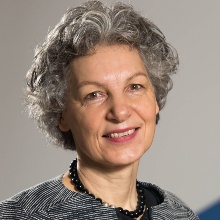On 14.07.2021, the University Council and the Senate at the University of Stuttgart elected the current Vice Rector for Information Technology as CIO for the second time, thus following the proposal of the joint selection committee. The vote took place in a digital meeting of both committees, led by Prof. Bernhard Keimer, Head of the University Council. The committee chose to elect the current incumbent with seven from nine valid votes in the University Council and with twenty-nine from thirty-eight valid votes in the Senate. The second term for the office of CIO begins on 01.01.2022 and lasts six years.
Dr. Simone Rehm initially took up the post in 2016, as part of a reorganization of employees in the area of information technology at the University of Stuttgart. The University Council and the Senate have now re-elected her for a second term in office, in a situation where the digitalization of research and teaching is of paramount importance in terms of a university's success and competitive capacity.
Following the vote, Prof. Wolfram Ressel, Rector at the University of Stuttgart, congratulated the old and new CIO. He emphasized just how important this position is for the University of Stuttgart, highlighting the fact that this has been starkly demonstrated by the pandemic, during which almost all processes were digitalized. Ressel went on to state that the digitalization process was successful due to university-wide coordination, a clear structuring of tasks, transparent prioritization and good communication.
Looking back at her first term in office, Simone Rehm named several milestones, where it was possible to implement important components of the digitalization strategy at the university of Stuttgart. Rehm said, "Today, teachers and students are benefiting from the fact that the entire course of study, from initial contact to graduation, is now fully digitally supported. The services for researchers have also been expanded. They now receive expert support when dealing with research data." In her coming term in office, she aims to continue promoting and encouraging the digital transformation. Rehm said, "I still see a lot of innovative power in digitally supported teaching, our research achievements must become more visible to the outside world, and above all I would like to simplify administrative processes so that there is more space for the inspiration and creativity that define a university.”
The Gender Equality Officer and the Rector presented the annual reports
The Gender Equality Officer and the Rector presented the annual reports in a joint public session of the Senate and University Council that took place prior to the CIO election. In addition, the Head of the University Council reported on the fulfillment of the University Council's responsibilities.
In her gender equality report, Prof. Nicole Radde drew attention to the additional burden on - primarily - female scientists who cared for children or family members during the Corona pandemic. She emphasized that in the coming years it must be ensured that this extra burden does not have a negative impact on equal opportunities in staffing and appointment procedures. Furthermore, strategies for successfully attracting female professors must also be applied to early career researchers, in order to ensure that progress is made in terms of the women's quota in mid-level faculties.
In his summary of the past year, Rector Prof. Wolfram Ressel thanked all teachers and students for their great commitment to mastering the challenges of digital teaching together and praised the cohesion that exists at the university. He went on to emphasize that it is now important to ensure a rapid return to on-site teaching. Ressel also announced that the University of Stuttgart University of Stuttgart would once again participate in applying for clusters of excellence as part of the upcoming excellence strategy of the federal and state governments. To identify potential clusters, the university will again rely internally on a balance of top-down and bottom-up processes.


